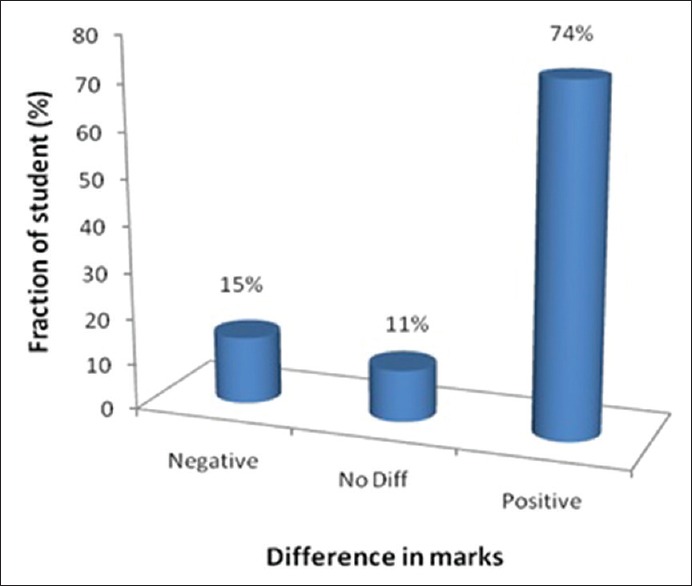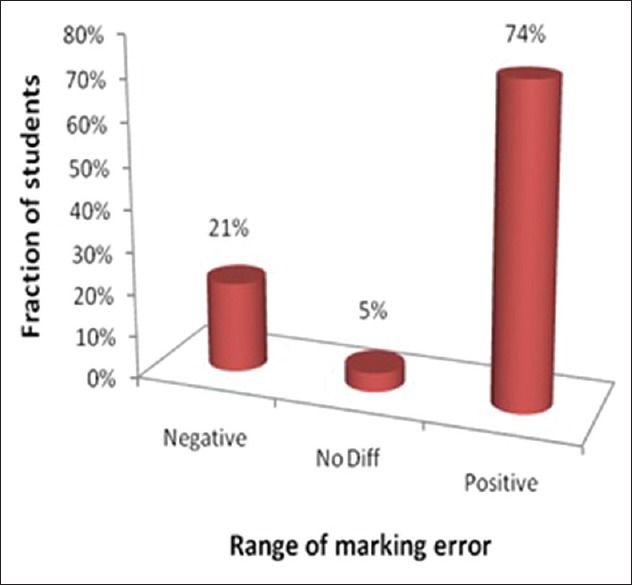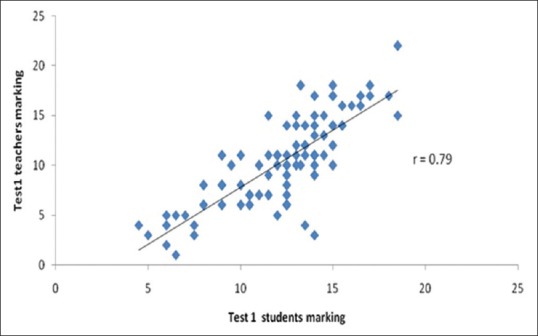Abstract
Context:
Tutor assessment is sometimes also considered as an exercise of power by the assessor over assesses. Student self-assessment is the process by which the students gather information about and reflect on their own learning and is considered to be a very important component of learning.
Aim:
The primary objective of this study was to analyze the impact of self-assessment by undergraduate medical students on their subsequent academic performance. The secondary objective was to obtain the perception of students and faculty about self-assessment as a tool for enhanced learning.
Materials and Methods:
The study was based on the evaluation of two theory tests consisting of both essay type and short answer questions, administered to students of the 1st year MBBS (n = 89). They self-assessed their performance after 3 days of the first test followed by marking of faculty and feedback. Then, a nonidentical theory test on the same topic with the same difficulty level was conducted after 7 days and assessed by the teachers. The feedback about the perception of students and faculty about this intervention was obtained.
Results:
Significant improvement in the academic performance after the process of self-assessment was observed (P < 0.001). There was a significantly positive correlation between student and teacher marking (r = 0.79). Both students and faculty perceived it to be helpful for developing self-directed learning skills.
Conclusions:
Self-assessment can increase the interest and motivation level of students for the subjects leading to enhanced learning and better academic performance, helping them in development of critical skills for analysis of their own work.
Keywords: Medical students, self-assessment, student learning
INTRODUCTION
The overall aim of education is to produce critical thinkers who should be able to evaluate and analyze different types of information gathered in their chosen field of expertise.[1] Contemporary approaches emphasize the active engagement of students in their own learning, learner responsibility, meta-cognitive skills, and a dialogical collaborative model of learning.[2] Self-assessment is considered to be very major component of learning because here the student gathers information and reflects on his own learning.[3] It enhances the potential of learner development as a lifelong learner.[1] Keeping these things in mind, the present study was planned with an objective to assess the impact of self-assessment by medical students on their subsequent academic performance.
MATERIALS AND METHODS
The present study was conducted in the Department of Physiology on the first year professional MBBS students. Prior approval from the Institutional Ethics Committee was obtained for the study. Written informed consent was obtained from the students for the study. The study was based on evaluation of two theory tests (Test I and Test II) on one topic in physiology, consisting of both essay type and short answer questions, administered to all students of the 1st year, at different intervals. Eighty-nine students participated in the study. The students who missed either Test I or Test II were excluded from the study. The faculty of the department was first sensitized about the methods to be adopted. Afterward, the students were apprised of the process of self-assessment and the way to conduct it. Two nonidentical theory tests were prepared, i.e., Test I and Test II. Test I was given to the students on the announced date for attempt. They were asked to gather information on these test topics in 3 days' time so as to self-assess their performance by marking their tests themselves after 3 days under the supervision of teachers. They awarded the marks on a sheet provided to them which was then collected and kept separately. Subsequently, blinding was carried out by hiding the roll numbers on the answer sheets of the students and the same theory tests were marked by the faculty. To ensure ambiguity in marking, one particular answer of all students was marked by one faculty member. After this, one to one feedback was given to the students by the evaluators about their attempt and announcement for a retest after 7 days was made. Then, a nonidentical (parallel) theory test on the same topic was given to them, and their performance in the retest was assessed by the same teachers after blinding. Marks awarded by students themselves and by faculty in Test I and Test II were then tabulated. The feedback about the perception of students and faculty about this intervention was obtained through prevalidated feedback questionnaires after two theory tests were completed.
Statistical analysis was done using SPSS (SPSS statistics version 16.0; Illinois, Chicago). Paired t-test was used to compare test awards by teachers in Test I and Test II. Marks obtained by students by self-assessment and those awarded by teachers in Test I were compared applying independent t-test. Correlation between self-grading and teacher grading in Test I was performed by calculating Pearson’s correlation coefficient. Feedback was obtained from students and faculty on a 5-point scale, i.e., strongly agree (SA), agree (A), neutral (N), disagree (DA), strongly disagree (SDA) and analyzed.
RESULTS
The study was done to assess the improvement in academic performance of the 1st year MBBS students after the process of self-assessment. Comparison of marks obtained in Test I and Test II, both assessed by teachers showed statistically significant increase in marks in Test II (P < 0.001). It was found that 74% students showed increase in marks in the second test [Figure 1].
Figure 1.

Difference of marks obtained by students in Test II as compared to Test I
Another comparison was made between Test I self-assessed by students and then the same Test I marked by teachers. Seventy-four percent of students over-assessed while 21% under-assessed and 3% had equally assessed themselves as compared to teacher evaluation [Figure 2]. However, among the students who over assessed themselves, 34% of the students over assessed only within 10% range of marks.
Figure 2.

Comparison of student marking showing the departure from teacher marking
Correlation coefficient (r) was calculated to look for the degree of similarity between teacher and student grades [Figure 3] and was found to be statistically significant (r = 0.794, P < 0.001).
Figure 3.

Correlation between student and teacher marking
Perception of students and faculty regarding the process of self-assessment obtained through feedback questionnaire showed that majority of them agreed to the various attributes and advantages of self-assessment. However, they found it to be a time-consuming process. They also suggested to carry this process of self-assessment from the start of the session. Students also opined that the discussion with peer group after self-assessment should be added. Faculty also perceived it as an effective tool for enhanced self-directed learning for students. They suggested that students should be motivated by the faculty to self-assess themselves.
DISCUSSION
Medical education traditionally asks students to master large amount of factual information. The didactic approach causes little opportunity to contest the medical curriculum and only a part of it is tested in high-stake examinations. The ability to assess one’s own work critically is often claimed as a goal of higher education even when self-assessment exercises are not the part of curriculum.[4] According to Andrade and Du, self-assessment is a process of formative assessment during which students reflect on and evaluate the quality of their work and their learning, judge the degree to which they reflect explicitly stated goals or criteria, identify strengths and weaknesses in their work and revise accordingly.[5] The present study has found significant improvement in the academic performance of students after the process of self-assessment as 74% of the students showed improvement in marks in subsequent test when marks of Test I and Test II evaluated by teachers were compared. Students also perceived this process of self-assessment to be helpful in increasing their knowledge and interest in the subject and found it motivating to develop self-directed learning skills. Improved academic performance and learning could be attributed to the fact that the students were curious to judge their own performance through self-grading and hence were motivated to go through the topics again. Self-evaluation is considered to be a very important component of learning as self-identification of his/her learning progress will motivate the student for further learning. In addition, further learning is possible only after recognition of what more needs to be learned.[2] Further, by evaluating the answers themselves, they were able to critically analyze their deficiencies and tried to be careful while attempting the second test. Herbert has also suggested that by this process of self-assessment, students begin to internalize instructional goals and begin to apply them to future efforts.[6] Boud also suggested that self-appraisal is a critical skill helpful for success not only in formal learning activities but also for lifelong learning that is such an essential part of our living in this rapidly and vastly changing world. Further, he suggested inculcation of self-assessment in the curriculum of higher education as formal activity that requires proper exposure as prior education does nsot seem to develop the skill to any extent.[1] This is mainly because traditional assessment is sometimes also regarded as exercise of power by the assessor/examiner over the assesses.[7] Assessment processes in which teacher holds all the power and makes all the choices limit the potential of learner development. Task of self-evaluation shifts the focus from something imposed by someone else to a potential partnership.[2]
Further, Evan et al. also concluded that doctors these days must focus on setting targets and goals for themselves and regularly assess their performance. They also suggested that self-assessment should be given the same importance in training as is given to development of communication skills. This a fundamental skill that should be introduced into both undergraduate and postgraduate education.[4]
Although the students tended to over assess themselves while marking, there was a significantly positive correlation between student and teacher marking (r = 0.79), indicating that students have the concept of quality. In a study, Sadler and Good have also found high correlation between teacher and student gradings.[8] In a similar study by Kirov et al., it was observed that 50% of students in preclinical course of dentistry overestimated their performance.[9] In our study, around half of the students who over assessed themselves did so only in the range of 10%. This being only a single trial, the students can be motivated and made accustomed to carry out self-assessment more meticulously. Such a process can help the students to develop critical skills to judge their own work which is an essential component of lifelong learning and so also have better understanding of the subject. This becomes all the more important during their career as these students will attain some senior positions when normally there is hardly any critical review of their performance. According to Antonelli, self-assessment of knowledge and accuracy of skill performance are essential to the practice of medicine and self-directed lifelong learning because now the individuals are themselves responsible for their own continuing professional development.[10] With such an exercise included in the curriculum, there are chances that the desired and required skill of self-assessment be imparted in them right at the time of germination.
One limitation of this study was that only one test could be conducted as it was near final examinations of the students. Another limitation found during study was that this process of self-assessment is time-consuming. Furthermore, student dropout at each step also was a limiting factor in this study. Such students had to be excluded from the study. The absence of control group was another limitation. A few students found it difficult to self-assess.
From this study, we can conclude that self-assessment can increase the interest and motivation level of students for the subject leading to better academic performance and enhanced learning. It can also help in development of critical skills among students to assess and analyze their own work, an essential component of self-directed lifelong learning.
Financial support and sponsorship
Nil.
Conflicts of interest
There are no conflicts of interest.
Acknowledgment
The authors would like to acknowledge the contribution of Faculty of Nodal Centre for help in shaping the project, Faculty of Physiology Department for help in conduction of this study, and Sh. Baltej Singh, Lecturer, Statistics, for giving expert advice relating to statistical analysis of this study.
REFERENCES
- 1.Boud D. Enhancing Learning through Self-assessment. London: Kogan Page; 1995. [Google Scholar]
- 2.Spiller D. Assessment matters: Self-assessment and peer assessment, teaching development. Hamilton, New Zealand: The University of Waikato; 2012. [Google Scholar]
- 3.Toronto, ON: Queen's Printer for Ontario; 2002. Ministry of Education. The Ontario Curriculum Unit Planner. [Google Scholar]
- 4.Evans AW, McKenna C, Oliver M. Self-assessment in medical practice. J R Soc Med. 2002;95:511–3. doi: 10.1258/jrsm.95.10.511. [DOI] [PMC free article] [PubMed] [Google Scholar]
- 5.Andrade H, Du Y. Student responses to criteria-referenced self-assessment. Assess Eval High Educ. 2007;32:159–81. [Google Scholar]
- 6.Sadler PM, Good E. The impact of self and peer grading on student learning. Educ Assess. 2006;11:1–31. [Google Scholar]
- 7.Brown G, Bull J, Pendlebury M. Assessing Student Learning in Higher Education. London: Routledge; 1997. [Google Scholar]
- 8.Herbert E. Lessons learned about student portfolios. Phi Delta Kappan. 1998;79:583–5. [Google Scholar]
- 9.Kirov D, Kazakova S, Kirilova J. Student’s self assessment in preclinical and clinical education of prosthetic dentistry. J IMAB. 2014;20:575–7. [Google Scholar]
- 10.Antonelli MA. Accuracy of second-year medical students' self-assessment of clinical skills. Acad Med. 1997;72(10 Suppl 1):S63–5. doi: 10.1097/00001888-199710001-00022. [DOI] [PubMed] [Google Scholar]


